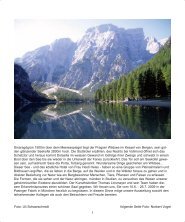Tobique First Nation, NB August 2010 - Schaarschmidt IT
Tobique First Nation, NB August 2010 - Schaarschmidt IT
Tobique First Nation, NB August 2010 - Schaarschmidt IT
You also want an ePaper? Increase the reach of your titles
YUMPU automatically turns print PDFs into web optimized ePapers that Google loves.
<strong>Tobique</strong> <strong>First</strong> <strong>Nation</strong>, <strong>NB</strong> July 2012<br />
Wulustuk Times<br />
Wulustuk - Indigenous name for St John River<br />
This publication produced monthly at <strong>Tobique</strong>, <strong>NB</strong>, Canada E7H 5K3<br />
Woodstock Indian Reserve Students - Woodstock Indian Day School - 1946
July 2012 - Table of Contents<br />
WOODSTOCK RESERVE (Part III)<br />
"QUÉBEC MUST ENGAGE IN A NATION-TO-NATION RELATIONSHIP" -CHIEF GHISLAIN<br />
PICARD<br />
NATIVE BAND'S BLACKADE DISRUPTS QUEBEC FORESTRY OPERATIONS<br />
CASH NOT KING WHEN <strong>IT</strong> COMES TO ABORIGINALS, PIPELINES<br />
LEGER: CREEPY GUYS AND BORDER GUARDS: PRIVACY UNDER SIEGE<br />
ATLEO WILL FACE STIFF COMPET<strong>IT</strong>ION IN JULY 18 AFN ELECTION<br />
AFN ELECTION 2012- ANNOUNCEMENT OF CANDIDATES FOR THE OFFICE OF<br />
NATIONAL CHIEF<br />
AFN CANDIDATE NELSON SAYS NORTHERN GATEWAY PIPELINE 'DEAD' IF HE'S<br />
ELECTED<br />
ABORIGINAL PEOPLE FILE HUNDREDS OF HUMAN RIGHTS COMPLAINTS<br />
SOCIAL SECUR<strong>IT</strong>Y NOW CALLED 'FEDERAL BENEF<strong>IT</strong> PAYMENT/ENT<strong>IT</strong>LEMENT'!<br />
DEAN'S DEN: FOOTSTEPS<br />
Wulustuk Times:<br />
Each month we gather and publish the latest, most current and relevant native<br />
information for our readers. Proceeding with this concept, we feel that a well informed<br />
person is better able to see, relate with, and assess a situation more accurately when<br />
equipped with the right tools. Our aim is to provide you with the precise tools and the<br />
best information possible.<br />
Contact:<br />
We can be reached at Box 3226, Perth-Andover, <strong>NB</strong>. Canada, E7H 5K3, or at Box 603,<br />
Ft. Fairfield, ME 04742. By phone, call us at 506-273-6737. On the net we’re at pesun<br />
(at) nbnet.nb.ca
WOODSTOCK RESERVE (Part III)<br />
Anything west of Fredericton was considered back country with little development.<br />
It was far from the ocean. There was little to attract tourism. It was considered a remote<br />
area. Sportsmen wishing to hunt or fish in the area were required to have an New<br />
Brunswick guide. No one from the states was permitted into the area during th snow<br />
season. On one occasion the famous Edwin Tappan Adney enjoyed playing the<br />
backwoodsman was in the post office one day when two sports from Boston appeared.<br />
One tried starting a conversation with the local asking Adney how he liked the Red Sox.<br />
"Don't know, never wear um." was the reply. The sports left bursting into laughter while<br />
inside those inside chuckled at the sophisticated sportsmen. The Penobscot Indians on<br />
their Old Town Island Reserve were much more dependent and familiar with the more<br />
sophisticated life of a large city such as Bangor and adjusted and accepted white ways<br />
much faster. Woodstock was about 25 years behind them in adapting to the white<br />
man's world.<br />
There were three levels of people at Woodstock: some were elderly instilled with<br />
the life and values of a hunting society, younger people who broke with Indian traditions<br />
and began to lean on the white culture surrounding them, and younger people who saw<br />
little future in keeping their culture. Out of this came some who were inspired and proud<br />
of their heritage. They were like the lumbermen log rollers who knew just how far they<br />
could go before braking and reversing the roll to dump their opponent in the water. They<br />
felt Indians must be prepared to enter the white world to survive. It was impossible to<br />
return to the hunter lifestyle. Women had a slight taste of life away from the reservation<br />
when they crossed their border to sell baskets to white households. Game laws forced<br />
the men away from their traditional hunting and fishing life. Other laws and regulations<br />
made it more difficult for Indians to retain their positions as guides, as they would have<br />
to pass a test requiring a good reading ability.<br />
Language is culture, it defines and describes the culture of the people who use it.<br />
The language changed a bit for each of the levels or groups as English came into use<br />
and soon over took the traditional language of the hunting society. The old language<br />
was slow, drawn out and often took much time to describe what a person wanted to say.<br />
Younger people wanted language to be faster. They began cutting off a letter or syllable<br />
here and there. They laughed at the older people with their slow drawn out way of<br />
speaking. Such speakers became very introverted and silent except when in the<br />
company of other elders. When one spoke in the traditional language, elders could<br />
usually tell the origin of the speaker or his parents. Each Maliseet village had some<br />
words, phrases, or distinguishing expressions used only by each individual village. Most<br />
Woodstockers retained good hearing having lived in a rather quiet world without radios,<br />
outboard motors. or other tools such as chainsaws. Hunters taught their families to be<br />
quiet. They did not want to scare game. The woods had become a noisy place. People<br />
often had to yell to be heard. Some elders discouraged the younger people in learning<br />
their language. They were sure that if one were to get on in the world, English was the<br />
language to know. Who beyond the reserve knew Maliseet? The real jobs were in the<br />
white world.<br />
In the 1960s professional linguists came to learn and save the almost lost Maliseet
language. The alphabet that they used included symbols to represent sounds in Indian<br />
languages not found in English or French. They had special typewriters equipped with<br />
the new alphabet. The linguists came with their alphabet, tape recorders, and funds to<br />
pay speakers to work with them. None of the residents felt that the new alphabet was<br />
necessary to retain language for reserve use. Only one or two Maliseet might have<br />
been able to read a paper published in the professional alphabet. The professional<br />
alphabet was a tool for the linguists trying to preserve this ancient language before it<br />
vanished.<br />
A linguist working in the Cree language, another Algonquian tongue very similar to<br />
the Maliseet language had produced a series of tapes said to be easy to teach<br />
language. I asked several elders to listen to it, The tape started: "Good morning" The<br />
words for 'good' and 'morning' followed in English. Then it continued, "I had an orange,<br />
cereal, and toast for breakfast". "Stop, stop. That is no good. We have a greeting but<br />
never used our word for 'good' and for 'morning' that way. We never had oranges,<br />
cereal or toast for breakfast." The introduction to the tape was short!<br />
After World War II the colorful stories and way of life were fast disappearing.<br />
Battery radios became very popular, especially with the young people who enjoyed the<br />
top ten of the best popular songs of the week. Although those who listened to their<br />
mothers and grandmothers sing songs everyday as they went about their work<br />
everyday, they could not recall their heritage music. The inexpensive battery radios<br />
probably did more to kill Maliseet culture than any other individual item.<br />
In the days when Indians depended on hunting, the men were up early and out on<br />
the trail or trap line. They usually did not return until almost dark tired, cold, and hungry.<br />
The women quickly prepared a meal for the hunters who enjoyed the hot food and tea<br />
after being out in the cold and snow for several hours. Many of the families retained the<br />
habit of serving the men first. When they finished the women and children ate. I<br />
wondered if the youngsters knew why they waited for the men to finish eating before<br />
they could have their meal.<br />
It seemed that the mid 20th century was an important time for parents and<br />
grandparents to emphasize Indians. As there was no church on the Woodstock<br />
Reserve, many felt that St. Ann's church on the Kingsclear Reserve or St. Ann's at<br />
<strong>Tobique</strong>. were the places to celebrate times together such as weddings and funerals. In<br />
both places the services were said in Indian, In Woodstock they attended the town<br />
Catholic Church where the back two or three rows of pews were reserved for Indians.<br />
The Kingsclear and <strong>Tobique</strong> churches were considered Indian churches.<br />
The custom that parents selected their children's spouse terminated in World War I.<br />
Two young lovers wanted to marry but parents of neither of them would approve of their<br />
children's marriage. The young man was so upset that he joined the army and was soon<br />
sent overseas. He was killed. The girl who wanted to marry the soldier became very<br />
distressed and down hearted. There was nothing her parents could do to make her<br />
happy. The event disturbed the entire community. The elders decided that in the future if<br />
two of their young people wished to marry, let them. The 19th century was a time of<br />
great Maliseet cultural change.
Funerals were noted places where one heard many traditional stories in which the<br />
departed one played a part.<br />
Older women still possessing special powers claimed that they would get back at<br />
anyone trying to cheat them. A stoic elder might claim that the lady at the farm stand<br />
pushed the scale down a bit or her vegetables were washed making them adding weight<br />
to the actual vegetables purchased. It made no difference if it was thumb or water that<br />
they paid for, the Indian customer would get back at the sales lady. If a barn burned, or<br />
some other accident occurred to a person whom the Indians felt cheated them within six<br />
months of the incident, an elder woman would excitedly claim credit for the loss.<br />
------------------------------------------------------------------------------<br />
"QUÉBEC MUST ENGAGE IN A NATION-TO-NATION RELATIONSHIP" -CHIEF<br />
GHISLAIN PICARD<br />
WENDAKE, QC - The Chief of the Assembly of <strong>First</strong> <strong>Nation</strong>s of Quebec and Labrador<br />
(AFNQL), Ghislain Picard, reacted to the blockade of logging companies this morning by<br />
the Atikamekw nation by urging the Quebec government to agree to set up a negotiation<br />
table to meet the demands of the Atikamekw. "The provincial government needs to stop<br />
ignoring the rights of the Atikamekw. It must immediately engage in a nation-to-nation<br />
relationship, which will lead to a sharing of resources and increased economic<br />
development for the communities," declared Chief Picard.<br />
The Atikamekw launched a campaign this morning to defend their rights, with their first<br />
actions being to block logging operations in their ancestral territory, the Nitaskinan. "The<br />
Atikamekw are the first owners of this territory which they have occupied for millennia.<br />
When the Europeans arrived, 400 years ago, the Atikamekw welcomed them and<br />
agreed to share the land and the resources. The "nation-to-nation" relationship must be<br />
rooted in true partnership. It must result in royalties for the <strong>First</strong> <strong>Nation</strong> on any resource<br />
operations in the ancestral lands, as well as measures to bridge the economic gap that<br />
separates the people in these communities from the general population in Quebec,"<br />
Chief Picard added.<br />
About the AFNQL<br />
The Assembly of <strong>First</strong> <strong>Nation</strong>s of Quebec and Labrador is the political organization that<br />
represents the 43 Chiefs of the <strong>First</strong> <strong>Nation</strong>s of Quebec and Labrador. www.apnqlafnql.com.<br />
For further information:<br />
AFNQL, Éric Cardinal, Communications Officer<br />
Cell: 514 258-2315, eric@cardinalcommunication.com
NATIVE BAND'S BLACKADE DISRUPTS QUEBEC FORESTRY OPERATIONS<br />
CP<br />
QUEBEC - Forestry operations in Quebec's Mauricie region were disrupted when<br />
aboriginal protesters blocked a railway line and logging road Wednesday.<br />
The Atikamekw band said they have a long list of complaints against the Kruger<br />
forestry company, which they accuse of operating without their consent and<br />
consultation.<br />
Native Affairs Minister Geoffrey Kelley told a news conference that Quebec<br />
government officials are trying to get the blockade lifted through negotiations.<br />
"I think we can find solutions at the table," he said before the weekly cabinet meeting in<br />
Quebec City.<br />
"We'll talk with them today to try and find a solution because a blockade is never good<br />
news for Quebec."<br />
One barrier was erected on Highway 25 between La Tuque and Wemotaci, and<br />
another between the hamlets of Parent and Clova.<br />
While trucks carrying timber were being stopped, area residents and tourists were still<br />
allowed through the barricades.<br />
The aboriginals have also said they'll allow Via Rail passenger trains through but have<br />
threatened to block Canadian <strong>Nation</strong>al Railway trains carrying freight.<br />
Kelley said the demonstrators' demands are numerous and complex. Some relate to<br />
federal land claims negotiations and others to infrastructure funding.<br />
"There are elements that fall in Quebec's jurisdiction and we are ready to sit down with<br />
the community and the Atikamekw nation to see if there are things that can be resolved<br />
bilaterally," said Kelley, who last met with Wemotaci and Obedjiwan community leaders<br />
about 10 days ago.<br />
Julie Boulet, the minister responsible for the region, expressed concern for the<br />
economy of the area, saying local workers "had been taken hostage."<br />
"It is deplorable to do this," she said. "There are manufacturers, sawmills, workers who<br />
are involved. Blocking timber transport by road or by rail, it's not a good way to<br />
negotiate."<br />
Public Security Minister Robert Dutil also said his department is tracking the situation,<br />
which he called "worrying."<br />
"There are concerns and we are watching the situation closely," he said. "We don't<br />
know what will happen but we know there is a lot of tension.
CASH NOT KING WHEN <strong>IT</strong> COMES TO ABORIGINALS, PIPELINES<br />
Native groups dispute Enbridge's claim that 60 per cent of first nations along route<br />
support project<br />
Vancouver Sun<br />
Money can't buy you love - that's a message several B.C. aboriginal groups sent on<br />
Wednesday to proponents of the Enbridge Northern Gateway pipeline.<br />
It came a day after Enbridge proudly announced it had secured support from a majority<br />
- almost 60 per cent - of aboriginal communities along the 1,177-kilometre pipeline route<br />
linking Bruderheim, Alta. with Kitimat.<br />
These communities have accepted Enbridge's offer of a 10-per-cent ownership stake in<br />
the controversial pipeline, now under federal regulatory review. Such a stake, over three<br />
decades, grants the aboriginal groups "ownership units" that would net them individual<br />
shares of $280 mil-lion in revenue.<br />
Balderdash. That, on Wednesday, was the reaction from the Coastal <strong>First</strong> <strong>Nation</strong>s, an<br />
alliance of 10 aboriginal groups in B.C. - among them, importantly, groups that stand to<br />
be most affected by a proposed petroleum tanker port in Kitimat.<br />
Art Sterritt, executive director of the Coastal <strong>First</strong> <strong>Nation</strong>s, maintains the Enbridge<br />
support was secured from "groups that either aren't located on the pipeline corridor or<br />
don't have land in B.C."<br />
Indeed, some are in Alberta. Enbridge, Sterritt charges, expanded its designated<br />
pipeline corridor by 80 kilometers in order to increase its sup-port; thus a number of<br />
signatories rep-resent communities outside areas that would be most affected by any<br />
spill.<br />
Keith Henry, president of Vancouver's B.C. Metis Federation, backed Sterritt's view.<br />
He asserts that the Abbotsford-based Metis <strong>Nation</strong> B.C. - lacking an appropriate<br />
mandate from the Metis people - signed the Enbridge deal.<br />
Reports Henry: "There is over 90-per-cent opposition from Metis people [to the<br />
pipeline] throughout B.C."<br />
The Union of B.C. Indian Chiefs is also disputing Enbridge's numbers.<br />
Enbridge, of course, is trying to turn the channel away from all the opposition. Clearly<br />
its deal with aboriginal groups is not as comprehensive as the company might have<br />
wished.<br />
Lord knows, it has bent over back-wards to woo first nations, even designating a vicepresident<br />
of aboriginal and stakeholder relations within its corporate ranks.<br />
On its website, Enbridge documents the tale of the Birdtail Sioux, an aboriginal group
living near a separate pipeline development in Manitoba. The Birdtail "found a path to a<br />
brighter future through partner-ship and collaboration," says the company.<br />
Lo, the group now has "a school, a health clinic, a general store, renovated homes, a<br />
water treatment plant and a host of economic development initiatives ..."<br />
Enbridge is promising the aboriginals living along the Northern Gate-way corridor some<br />
$400 million worth of employment, procurement and joint venture opportunities.<br />
As many as 15 per cent of all construction jobs are to be reserved for aboriginals.<br />
But for opponents, throwing even the sun and moon into the bargain won't make any<br />
difference, no matter how needy some of the aboriginals may be.<br />
And what is occurring at the moment is simply so much posturing that, in the final<br />
analysis, may not make much difference to either side.<br />
Because this megaproject is inexorably headed for a showdown, one that's bound to<br />
take place at a B.C. court-house and then work its way to the docket of the Supreme<br />
Court of Canada in Ottawa.<br />
At this point, no one appears to know how soon after the federal regulatory review<br />
concludes next year the first nations will pursue their legal action.<br />
And few have any idea what the Harper government's ultimate game plan will be to<br />
legislatively safeguard a project it has designated as a strategic imperative to enable<br />
Canadian trade with Asia.<br />
Only this is certain - it should be quite a show.<br />
------------------------------------------------------------------------------<br />
LEGER: CREEPY GUYS AND BORDER GUARDS: PRIVACY UNDER SIEGE<br />
Did you catch that story about Facebook spending some loose change, $60 million, to<br />
buy a firm specializing in facial recognition? Face.com is based in Israel and according<br />
to the Daily Mail in the U.K., has been partly backed by Russian money.<br />
Facial recognition software is getting cheaper to buy and easier to use. Face.com's<br />
technology puts it on your phone, speeding up, simplifying and commercializing the<br />
process of matching faces and names in photographs posted to Facebook. With 250<br />
million photos being uploaded every day and 900 million users worldwide, a lot of facematching<br />
happens on Facebook.<br />
The mega-network says it's acquiring Face.com to improve its photo applications for<br />
the 500 million of its members using mobile devices.
All those images on all those devices means Facebook "has essentially become a<br />
worldwide photo identification database," according to Forbes magazine. And an<br />
irresistible target for hackers who could have a field day with all those names and faces,<br />
birthdays, hometowns, personal interests, family and work information and more.<br />
It also means that creepy guy down the street might be able to snap a picture and use<br />
a simple application to link your image to your Facebook profile. Researchers have<br />
already proved that's possible, obtaining a startling amount of information about people<br />
just from simple snapshots and online profile information.<br />
Facebook tries to say the right things about privacy, but many experts say its practices<br />
are opaque, just like that other big user of intrusive technologies, the federal<br />
government.<br />
Which brings us to another news story: the one about the Canada Border Services<br />
Agency setting up high-definition cameras and audio recorders to eavesdrop on<br />
travellers in Canadian airports, including those in Ottawa and Halifax.<br />
You can bet those surveillance devices have powerful face and voice recognition tools<br />
and who knows what else? Engineers are now building identification software that uses<br />
video to analyze an individual's walking gait. It's said to be as reliable as a fingerprint.<br />
The secret audio surveillance just gilds the gold-plated border security system we<br />
already have: document demands, body searches, chemical detection, X-ray scanners,<br />
metal detectors, sniffer dogs, private security personnel, border guards and Mounties, all<br />
with immense baggage trains in support.<br />
But there's a problem with CBSA's yen for face time with travellers. The technology<br />
was put into service with no notice or debate about whether it is actually needed or<br />
conformed with privacy laws. No impact statement was filed with the federal privacy<br />
commissioner.<br />
The border agency didn't say how the information will be used, how it will be protected<br />
or who gets access to it. It simply went ahead and snooped. It's not clear who in the<br />
federal food chain signed off on using the technology or who approved its budget. Who<br />
did?<br />
On Facebook, you can shut down your account and walk away, albeit with a permanent<br />
digital footprint. You can't walk away from the national security apparatus. And since the<br />
CBSA seems to exist in a state of primitive democracy with little accountability or<br />
oversight, we'll have a hard time finding out who approved what. Unlike the Canadian<br />
Security Intelligence Service, the border agency doesn't have a civilian oversight body to<br />
keep it honest.<br />
News of the secret surveillance also led to a familiar phenomenon: Public Security<br />
Minister Vic Toews eating his words. A day after telling Parliament that "the privacy<br />
rights of law-abiding Canadians are respected at all times," Toews had to tell CBSA to
turn off the bugs and finish its paperwork.<br />
Did Toews know what his ministry was up to or did the surveillance go ahead without<br />
his sanction? Either is bad. If he knew and didn't rein in the CBSA for disrespecting the<br />
law and violating privacy, Toews failed in his ministerial duties. If he didn't know, then<br />
CBSA put one past him and he has again flopped as a minister.<br />
Privacy is part of security and maybe it's not Facebook's job to protect it. However, it is<br />
our national government's job to defend all the rights of citizens, including privacy rights,<br />
as forcefully as it defends the borders.<br />
Dan Leger -Halifax.<br />
------------------------------------------------------------------------------<br />
ATLEO WILL FACE STIFF COMPET<strong>IT</strong>ION IN AFN ELECTIONS<br />
Seven others vie for leadership<br />
Ottawa Citizen<br />
The powerful group that represents Canada's <strong>First</strong> <strong>Nation</strong>s will elect a new leader next<br />
month, but with eight people vying for the job the choice between the status quo and a<br />
radical change is bound to be a contentious one.<br />
The issues for the more than 700,000 members of <strong>First</strong> <strong>Nation</strong>s living on-and offreserve<br />
are clear: more than 100 rural and remote com-munities lack access to safe<br />
drinking water, housing crises abound, northern communities face rising food prices,<br />
land rights and resource-revenue sharing issues are heating up on resource-rich<br />
reserves and claims that Canada is not honouring its various treaties are rampant.<br />
The job of national chief of the Assembly of <strong>First</strong> <strong>Nation</strong>s - which represents all<br />
members of <strong>First</strong> <strong>Nation</strong>s - is to advocate and press for change at the federal and<br />
provincial levels.<br />
Jacqueline Romanow studies indigenous governance at the University of Winnipeg.<br />
She said the difference between the candidates will be their approach to the mammoth<br />
job.<br />
While supporters of incumbent AFN national chief Shawn A-in-chut Atleo - who is<br />
seeking re-election - say he has spent the last three years fostering relationships and<br />
laying groundwork for change, his critics say his approach has been too conciliatory and<br />
even go so far as to accuse him of being too cosy with the Conservative government.<br />
Seven people - three men and four women - have thrown their hats in to replace him,<br />
demonstrating the level of dissent within the communities, said Romanow, who teaches<br />
a course on Aboriginal Politics in Canada.<br />
"Atleo has his base of support" - mostly in his home province of B.C. - "but there are a
lot of chiefs, particularly in the Prairies, who aren't happy with him."<br />
Atleo's supporters point to successes such as creating a joint education panel with the<br />
federal department of Aboriginal Affairs and Northern Development to take the pulse of<br />
on-reserve education across the country, and bringing chiefs and the government to the<br />
table at February's Crown-<strong>First</strong> <strong>Nation</strong>s Gathering.<br />
But Romanow said many <strong>First</strong> <strong>Nation</strong> communities saw the Ottawa gathering as a<br />
mere "photo-op" and many in those communities refused to participate in the education<br />
panel, which they said was created without consultation.<br />
The female candidates are: Pam Palmater, a Mi'kmaw lawyer and professor at the<br />
University of Toronto and a longtime critic of Atleo; Diane M. Kelly, an Ojibway from<br />
Onigaming <strong>First</strong> <strong>Nation</strong>, also a lawyer and the first female Grand Chief of the Grand<br />
Council of Treaty #3; Mo-hawk activist Ellen Gabriel, from Kahnesatake in Quebec, who<br />
was a major voice during the Oka Crisis in 1990; and Joan Jack, a lawyer and band<br />
counsellor from the fly-in Aan-ishinaabe Ikwe community of Berens River <strong>First</strong> <strong>Nation</strong> in<br />
Manitoba.<br />
The male candidates are two AFN regional chiefs who have worked with Atleo: George<br />
Stanley, former chief of Frog Lake <strong>First</strong> <strong>Nation</strong> and current Regional Chief of Alberta,<br />
and Dene leader Bill Erasmus, the regional chief in the North and brother of former AFN<br />
national chief Georges Erasmus. Also running is Terrance Nelson, former chief of<br />
Manitoba's Roseau River Anishinabe <strong>First</strong> <strong>Nation</strong>, who has vowed, if elected, to block<br />
the proposed Northern Gateway pipeline project, intended to link Alberta's oilsands with<br />
the B.C. coast and Asian markets.<br />
Those who accuse Atleo of being too close to the prime minister say it's time to force<br />
the government to begin treating <strong>First</strong> <strong>Nation</strong>s leaders as equals, says Shari Narine,<br />
who covers the AFN for Windspeaker, the national aboriginal newspaper.<br />
She said it's significant half the candidates are women because only a handful of<br />
women have ever run for leader.<br />
Romanow said their presence will change the way the race is run be-cause, as women,<br />
they are closer to urgent issues on the ground.<br />
While none of the female candidates has come out on so-called traditionally female<br />
causes, such as child welfare or family violence, Romanow said that approach may<br />
indicate they understand the political realities of the AFN.<br />
"The majority of chiefs at the AFN are male, so if you come out with really strong profemale<br />
agenda, then you're going to immediately alienate a majority of the voters, who<br />
don't seem to have an interest in changing the status quo," she said.<br />
Narine said that although the women all bring what she calls a "strong combination of<br />
European education and tradition" to the table, Atleo likely will get a mandate to continue<br />
his work.
"After three years of knowing where he stands and what to do and how things work,<br />
now he can move on to taking action." The election will take place in Toronto on July 18<br />
during the AFN's annual general meeting. The next <strong>Nation</strong>al Chief will serve for three<br />
years.<br />
------------------------------------------------------------------------------<br />
AFN ELECTION 2012- ANNOUNCEMENT OF CANDIDATES FOR THE OFFICE OF<br />
NATIONAL CHIEF<br />
OTTAWA, June 13, 2012 /CNW/ - The Office of the Chief Electoral Officer, responsible<br />
for the July election of the Assembly of <strong>First</strong> <strong>Nation</strong>s (AFN) <strong>Nation</strong>al Chief, has received<br />
nomination papers in proper form from the following persons, listed below in alphabetical<br />
order:<br />
Mr. Shawn Atleo<br />
Mr. Bill Erasmus<br />
Ms. Ellen Gabriel<br />
Ms. Joan Jack<br />
Ms. Diane M. Kelly<br />
Mr. Terrance Nelson<br />
Ms. Pamela Palmater<br />
Mr. George Stanley<br />
According to the AFN Charter, an eligible candidate must:<br />
Be eighteen (18) years of age or older;<br />
Be of <strong>First</strong> <strong>Nation</strong> ancestry;<br />
Be a member of <strong>First</strong> <strong>Nation</strong> community, in good standing with the AFN; and,<br />
Have 15 eligible electors, <strong>First</strong> <strong>Nation</strong>s Chiefs, endorse his/her candidacy.<br />
The 2012 Election for the Office of AFN <strong>Nation</strong>al Chief will take place July 18, 2012<br />
during the AFN 33rd Annual General Assembly taking place at the Metro Toronto<br />
Convention Centre in Toronto, Ontario, July 17-19, 2012.<br />
The AFN Charter article 22 states that the <strong>Nation</strong>al Chief shall be elected by a majority<br />
of sixty (60) per cent of the votes. There are 633 <strong>First</strong> <strong>Nation</strong> communities in Canada<br />
that are recognized as members of the Assembly of <strong>First</strong> <strong>Nation</strong>s.<br />
The Assembly of <strong>First</strong> <strong>Nation</strong>s is the national organization representing <strong>First</strong> <strong>Nation</strong><br />
citizens in Canada.<br />
Below is the campaign contact information for each candidate.<br />
Mr. Shawn Atleo<br />
PO Box 45082<br />
Surrey, BC V4A 9L1
Website: www.shawnatleo.com<br />
PH: 855.742.9612<br />
FX: 866.210.2064<br />
Email: info@shawnatleo.com<br />
Mr. Bill Erasmus<br />
Box 2101 100 Ndilo, Sikyea<br />
Tidi, NT X1A 2P6<br />
Website: www.votebille.com<br />
Email: support@votebille.com<br />
PH: 867.444.8847 (Barrett Lenoir)<br />
Ms. Ellen Gabriel<br />
PO Box 4056<br />
Kanehsata:ke, QC, J0N 1E0<br />
PH: 450.479.1651<br />
Cel: 514.730.2314<br />
Email: katsitsakwas1@hotmail.com<br />
Ms. Joan Jack<br />
Box 346<br />
Berens River, MB R0B 0A0<br />
PH: 204.382.3150<br />
CEL: 204.479.3004<br />
Email: joanjack.nc@gmail.com<br />
Mr. Terrance Nelson<br />
PO Box 346<br />
Letellier, MB R0G 1C0<br />
PH: 204.859.0021<br />
Email: terrancenelson74@gmail.com<br />
Ms. Diane M. Kelly<br />
81 Canberra Rd<br />
Winnipeg, MB R2J 1W3<br />
PH: 204.797.7126<br />
Email: diane.m.kelly@hotmail.com<br />
Ms. Pamela Palmater<br />
64 Crawford Dr.<br />
Ajax, ON L15 3A8<br />
PH: 905.239.5564<br />
CEL: 905.903.5563<br />
Website: www.pampalmater.com<br />
Mr. George Stanley<br />
Box 629<br />
Frog Lake, AB T0A 1M0
PH: 306-441-3720<br />
Email: jorgestanley7@gmail.com<br />
Email: albertangus@sasktel.net<br />
For further information:<br />
Loretta Pete Lambert, AFN Chief Electoral Officer, (613) 241-6789 ext. 359 or<br />
lpetelambert@afn.ca<br />
Kelly Whiteduck, Executive Assistant to the AFN Chief Electoral Officer, (613) 241-<br />
6789 ext. 234 or kwhiteduck@afn.ca<br />
Please note AFN communications will still handle regular AFN/<strong>Nation</strong>al Chief business<br />
and media requests for the campaign period, but requests specific to the AFN election or<br />
campaigns must go through the Chief Electoral Officer or respective campaign<br />
teams/contacts.<br />
------------------------------------------------------------------------------<br />
TERRANCE NELSON SAYS NORTHERN GATEWAY PIPELINE 'DEAD' IF HE'S<br />
ELECTED<br />
<strong>Nation</strong>al Post<br />
CALGARY - Billing himself as a radical candidate in the upcoming election for chief of<br />
the Assembly of <strong>First</strong> <strong>Nation</strong>s, Terrance Nelson has suggested a physical altercation<br />
awaits if the controversial Northern Gateway pipeline is built without the support of<br />
indigenous northern B.C. communities.<br />
Mr. Nelson, who won 10% of the vote share in the 2009 elections, has long advocated<br />
more <strong>First</strong> <strong>Nation</strong>s control over natural resources.<br />
"I think it's very clear the Gateway project would be dead if I was elected national chief<br />
on the basis that the only way it would go through was if the . people in northern B.C.<br />
allowed it to go through," he said.<br />
Mr. Nelson is one of seven candidates challenging <strong>Nation</strong>al Chief Shawn Atleo, who<br />
won the post in 2009. The election is expected to take place on July 18 in Toronto.<br />
A five-time chief of the Roseau River Anishinabe <strong>First</strong> <strong>Nation</strong> in Manitoba, Mr. Nelson<br />
courted controversy in 2007 by saying: "There's only two ways to deal with the white<br />
man. Either you pick up a gun or you stand between him and his money."<br />
Mr. Nelson said he understood the economic importance of the Northern Gateway<br />
pipeline and was not opposed to the project, which would ship bitumen from Alberta's<br />
northern oil sands to a deep-water port in Kitimat B.C. However, he would abide by the<br />
decisions of the communities that would be most affected by the environmental risks if<br />
Enbridge wins approval for the pipeline.
"The only way it will go through is if <strong>First</strong> <strong>Nation</strong>s are offered something substantially<br />
more than what they're being offered now," he said. If not, the former chief said he had<br />
the ability to bring in U.S. activists to help oppose the project.<br />
"If the Gateway project is going to be pushed through, and there is a physical<br />
presence, pipeline workers, RCMP, even the army, to get that pipeline through, I think<br />
one of the things <strong>First</strong> <strong>Nation</strong>s have to do is decide how far they're going to go to stop<br />
the pipeline," he said. "If you're going to do this, there's going to have to be a physical<br />
presence. There will be environmentalists from all over the U.S., and it's going to<br />
become a big issue."<br />
Some of the most vocal environmental opponents of the pipeline have been accused of<br />
taking money from opaque organizations in the United States.<br />
The pipeline, which is undergoing a federal review, is intended to diversify the country's<br />
energy market. Currently a lack of pipeline infrastructure has left much of Alberta's<br />
bitumen unable to reach key U.S. refineries. As a result, it's sold at a steep discount to<br />
global crude oil prices.<br />
------------------------------------------------------------------------------<br />
ABORIGINAL PEOPLE FILE HUNDREDS OF HUMAN RIGHTS COMPLAINTS<br />
162 complaints filed against <strong>First</strong> <strong>Nation</strong>s governments, 150 filed against federal<br />
government<br />
CBC News<br />
The Canadian Human Rights Commission has received more than 300 complaints<br />
from aboriginal people and <strong>First</strong> <strong>Nation</strong>s groups since 2008, when legislation was<br />
changed to allow the commission to look at issues such as reserve housing and federal<br />
funding for reserve services.<br />
"Aboriginal peoples, <strong>First</strong> <strong>Nation</strong>s in particular, are looking at the Canadian Human<br />
Rights Commission as being a potential, as a catalyst for change of the living conditions<br />
on reserve," says David Langtry, the acting chief commissioner.<br />
The Canadian Human Rights Act was amended in 2008 to include issues under the<br />
Indian Act, which had previously been excluded. The revised legislation applied<br />
immediately to the federal government, the commission says, while <strong>First</strong> <strong>Nation</strong>s<br />
governments were given three years to prepare for the transition.<br />
One of the complaints comes from the Mississaugas of the New Credit <strong>First</strong> <strong>Nation</strong>, in<br />
southern Ontario, where two young boys with learning disabilities need special<br />
education, equipment and supervision at school.
The federal government provides a certain amount of money every year for education,<br />
but Chief Bryan LaForme says there's a ceiling, with no flexibility for unique cases.<br />
"If we lived on the other side of the tracks, that would be open and our young people -<br />
the special ed students - there would be no issues as to cost. That would be provided by<br />
the province for those young people," LaForme says.<br />
The chief filed a complaint about the issue with the commission and recently learned<br />
it's going to a tribunal.<br />
"There was no other avenue to take our complaint to until the legislation was passed<br />
about human rights becoming effective for <strong>First</strong> <strong>Nation</strong>s."<br />
New obligations under act<br />
Laforme says <strong>First</strong> <strong>Nation</strong>s also need resources, such as legal expertise, to help them<br />
resolve allegations of discrimination now that local bands have obligations and<br />
accountability under the Human Rights Act.<br />
Complaints summary<br />
The commission says 162 complaints have been filed against <strong>First</strong> <strong>Nation</strong>s<br />
governments:<br />
47 of those complaints are undergoing further examination by the commission.<br />
38 are in the early stages of the commission process.<br />
77 have been closed.<br />
The commission says 150 complaints have been filed against the federal government:<br />
3 of those complaints are in the early stage of the commission process.<br />
62 are under examination at the commission.<br />
13 have been referred to the Canadian Human Rights Tribunal for adjudication.<br />
72 have been closed.<br />
Source: Canadian Human Rights Commission<br />
Langtry said there are many issues facing <strong>First</strong> <strong>Nation</strong>s, particularly on reserves,<br />
pointing to concerns about everything from access to clean water, health, education,<br />
policing and child welfare.<br />
He has been told there "could be a great reluctance to make a complaint because that<br />
person has to continue to live in that community"<br />
But complaints have been filed - 162 against <strong>First</strong> <strong>Nation</strong>s governments and 150<br />
against the federal government.<br />
One case involving the federal government was brought by the Assembly of <strong>First</strong><br />
<strong>Nation</strong>s and a child welfare group, who allege that funding for child welfare services on<br />
reserves is discriminatory because it's less than funding provided by provinces and<br />
territories for non-aboriginal children off-reserve.
In April, the Federal Court rejected the federal government's attempts to prevent <strong>First</strong><br />
<strong>Nation</strong>s groups from arguing for better funding for child welfare on reserves.<br />
The federal government had tried to block the case, saying federal and provincial<br />
funding levels for services couldn't be compared.<br />
The Canadian Human Rights Tribunal initially sided with the government's view and<br />
dismissed the case. But the Federal Court disagreed and ordered the tribunal to hold a<br />
new hearing with a new panel. The attorney general has appealed the Federal Court's<br />
ruling.<br />
------------------------------------------------------------------------------<br />
SOCIAL SECUR<strong>IT</strong>Y NOW CALLED 'FEDERAL BENEF<strong>IT</strong> PAYMENT/ENT<strong>IT</strong>LEMENT'!<br />
Have you noticed, your Social Security check is now referred to as a "federal benefit<br />
payment"?<br />
I'll be part of the one percent, to forward this, our government gets away with way too<br />
much in all areas of our lives, while they live lavishly on their grossly overpaid incomes!<br />
KEEP passing THIS AROUND UNTIL EVERY ONE HAS READ <strong>IT</strong>.....<br />
This was sent to me, I am forwarding it because it does touch a nerve in me.<br />
Remember, not only did you contribute to Social Security but your employer did too. It<br />
totaled 15% of your income before taxes. If you averaged only $30K over your working<br />
life, that's close to $220,500.<br />
If you calculate the future value of $4,500 per year (yours & your employer's<br />
contribution) at a simple 5% (less than what the government pays on the money that it<br />
borrows), after 49 years of working you'd have $892,919.98.<br />
If you took out only 3% per year, you'd receive $26,787.60 per year and it would last<br />
better than 30 years (until you're 95 if you retire at age 65) and that's with no interest<br />
paid on that final amount on deposit! If you bought an annuity and it paid 4% per year,<br />
you'd have a lifetime income of $2,976.40 per month.<br />
Entitlement my butt, I paid cash for my social security insurance!!!! Just because<br />
they borrowed the money, doesn't make my benefits some kind of charity or handout!!<br />
Congressional benefits ---- free healthcare, outrageous retirement packages, 67 paid<br />
holidays, three weeks paid vacation, unlimited paid sick days, now that's welfare, and<br />
they have the nerve to call my social security retirement entitlements?<br />
We're "broke" and can't help our own Seniors, Veterans, Orphans, Homeless.
In the last months we have provided aid to Haiti , Chile , and Turkey . And now<br />
Pakistan .......hideout of bin Laden. Literally, BILLIONS of DOLLARS!!!<br />
Our retired seniors living on a 'fixed income' receive no aid nor do they get any breaks<br />
while our government pour Billions of $$$$$$'s and Tons of Food to Foreign Countries!<br />
They call Social Security and Medicare an entitlement even though most of us have<br />
been paying for it all our working lives and now when it's time for us to collect, the<br />
government is running out of money. Why did the government borrow from it in the first<br />
place? Imagine if the *GOVERNMENT* gave 'US' the same support they give to other<br />
countries.<br />
Sad isn't it?<br />
Bet 99% of people won't have the guts to forward this.<br />
I'm one of the 1% -- I Just Did.<br />
------------------------------------------------------------------------------
DEAN'S DEN: FOOTSTEPS<br />
Footsteps<br />
Today I found some footsteps<br />
That appeared to wander to and fro<br />
I decided that I'd follow them<br />
Just to see where they might go,<br />
I couldn't seem to gain on them<br />
Thither - close - then yon<br />
One moment they were emphasized<br />
And the next were almost gone,<br />
They led me through "dark places"<br />
Where the mood was black as night<br />
And into tiny cornices<br />
Suffused by gorgeous light,<br />
Sometimes I'd sense a rhythm<br />
Of what Creation means<br />
Might it be a spirit calling<br />
Or, maybe angel wings,<br />
Each locale I tracked them<br />
Had the feel of speak or teach<br />
But the truth that I was groping for<br />
Was always slightly out of reach,<br />
Until - I began to realize<br />
And, that knowledge was the key<br />
For the footsteps I was following<br />
Had circled ... back to me!<br />
D.C. Butterfield<br />
Believe in yourself! Have faith in your abilities! Without a humble but reasonable<br />
confidence in your own powers you can be successful or be happy.


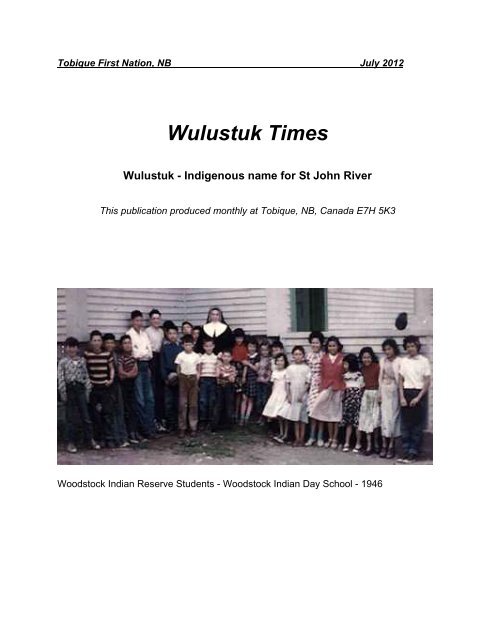
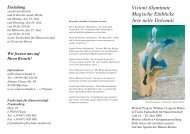
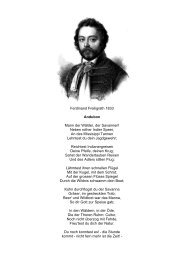
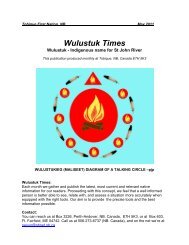

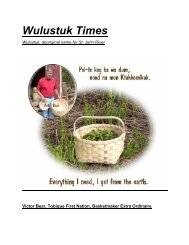
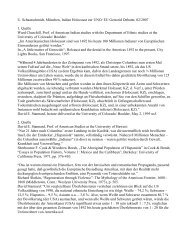
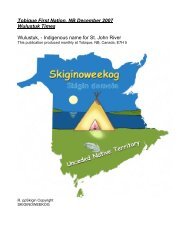


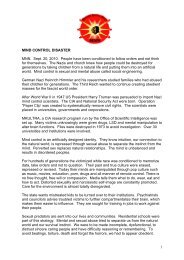

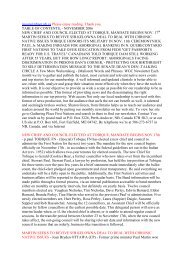
![WE HOLD THE ROCK [ALCATRAZ], SAID ... - Schaarschmidt IT](https://img.yumpu.com/22715400/1/184x260/we-hold-the-rock-alcatraz-said-schaarschmidt-it.jpg?quality=85)
